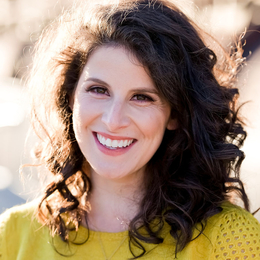
Follow Her
Megan Angelo’s novel imagines a not-too-distant future in which the evolution of social media erases the thin line between privacy and celebrity.
Smartphones and social media have changed daily life in ways we couldn’t have imagined 10 years ago. While such technology has made certain tasks tremendously convenient, not all of the resulting changes have made life better.
This fact informed Megan Angelo as she penned her first novel, Followers, published by Graydon House Books in January. Described by readers as both “thoughtful” and “terrifying,” the book envisions a future in which technology has in many ways erased the line between privacy and celebrity. Although much of the story is set 30 years hence, Angelo admits that reality is quickly catching up to the futuristic world she imagined.
A graduate of Villanova University who grew up in Quakertown, Angelo started her career as a journalist; her byline has appeared in The New York Times, Glamour, and Elle, among others. She’s working on a follow-up novel about two friends who come of age at the turn of the century, at the dawn of the so-called Internet age. She refers to the novel as “part coming-of-age story, part love letter to those clunky technologies” that enabled people to connect online.
We spoke with Angelo about her novel, her uneasy relationship with technology, and the delicate balance required to manage her dual roles as a full-time mother of three young children and a successful writer of novels and TV screenplays.
Q&A
Why did you want to write Followers?
I had a 2-year-old and a baby at the time, so writing it gave me a reason to go in the other room and do something else; it was a diversion, essentially. I love my kids, but I think every parent has these moments from time to time. … Looking back, what I see in the pages is that I feel deeply ambivalent about the role of social media, so in that way the book really reflects how I feel. I’m 35, so I’ve lived half my life before smartphones, and I don’t necessarily like all of the changes they have brought about.
Do you think, now that we’ve let the genie out of the bottle, humanity is destined for the kind of future you’ve imagined in the book?
It’s not as outrageous today as we would have considered it years ago, and we’ve definitely moved in the direction of the book. … I hope we’re not headed for the 2051 I imagined in the book, not as severe, but I don’t know we will be able to step back from where we are now. I can fall down an Instagram rabbit hole as easy as the next person, but sometimes, even in a waiting room, I don’t want to have my neck bent over my phone. I walked into an exercise class this morning, and it was an eerie image; all along the ballet barre, six to seven women were staring into rectangles of light. I really find myself thinking about the chance connections we used to make simply by being out in the world, and I wonder if we will ever see them again.
To me, Followers is a book about the desire for human connection, but this book would qualify as sci-fi. Did you read much sci-fi as you were writing?
I really didn’t. I took a course in sci-fi at Villanova, so it was probably more of osmosis and muscle memory. I intentionally stayed away from diving into that stuff. I really wanted to write the book as something like historical fiction in reverse. … The draft I used to get my agent was very different from the book you have there. I had never written a novel before; I don’t have an MFA. I spent many years writing TV and movie scripts, and I conceived of this as a feature, so it was a huge experiment for me. I made revision after revision, revising the story upwards of a dozen times. … I wasn’t sure it was going to work until I started taking it out to trusted readers.
Tell me about the pains of writing a novel with the demands of family and the other commitments life puts in a writer’s way.
Before I had kids I was trying to write these [TV] scripts and cross over to someone who writes creatively for 10 hours a day. Of course that didn’t work out, and now I have three kids—ages five, three, and one—and that makes it really difficult, because I am someone who likes to write and write. Now I’m a full-time caretaker, which leaves me with nights, weekends, and mornings. In other ways, the demands on my time have been great for me as a writer; they’ve made me lean and mean. I haven’t had writer’s block in five years, because my schedule has made me more organized, less indulgent, and I do think it has given me a different perspective. Also, motherhood runs throughout [Followers] in a way that it couldn’t have before I had that experience.
Published (and copyrighted) in Suburban Life magazine, April 2020.


